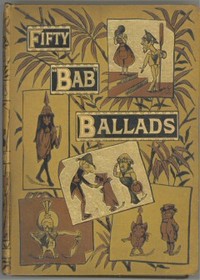Ballad: Thomas Winterbottom Hance
byThomas Winterbottom Hance stands as a comical legend in his quiet English corner, revered for his unmatched finesse with a saber. Each morning, without fail, he slices through legs of mutton, fabric, and other helpless items with surgical precision, drawing gasps from bystanders and admiration from locals. His skill is performed not in battle, but in display—an art form that no enemy challenges, yet one that remains astonishing. Across the sea in Calais, however, this daily exhibition draws scorn rather than awe. Monsieur Pierre, a Frenchman of similarly theatrical flair, considers Hance’s routine ridiculous, scoffing at the idea of proving one’s valor through lifeless targets. Pierre, with equal pride, views himself as the boldest figure in France, though he, too, rarely finds occasion to cross swords in actual combat. This distance fuels a rivalry not of injuries, but of ego—two men, worlds apart, dueling in reputation, not reality.
What deepens this satire is not just the rivalry between Thomas and Pierre, but the way their aging mothers play into the absurd drama. Hance’s mother, modest and kind, travels to Dover out of innocent pride, longing to see her son’s famed technique for herself. Her journey, touching in its simplicity, highlights the contrast between parental love and the pompous behavior of their sons. In Calais, Pierre’s own mother, nearly ninety and dressed in high fashion, views her son’s disdain for Hance as righteous patriotism. Her pride matches his in arrogance, both convinced of France’s superior swordsmanship and honor. Despite their differences in demeanor, both mothers fiercely believe in their sons’ greatness. They serve as both comic relief and quiet reminders of how family pride can both elevate and blur reality. Through these maternal figures, the tale adds heart to its humor, layering satire with warmth.
As the tension grows between the two men, no duel actually occurs. Instead, they remain locked in a standoff of performance and reputation, with each believing the other’s fame is unearned. Thomas continues his daily routines, indifferent to Pierre’s complaints, slicing items that offer no resistance with grace and ease. Pierre, unwilling to cross the Channel, merely fumes from afar, his swordsmanship untested outside of bluster. The audience is left to laugh at the absurdity—two self-proclaimed masters who, for all their practice and pride, never actually cross blades. The ballad doesn’t need a battle to reach its climax. The comedy lies in the futility of their pride, the theatrical nature of their routines, and the absolute conviction they both carry without question.
Behind its humor, the ballad gently mocks the need to prove oneself through empty gesture. Thomas’ mutton-cutting serves no real purpose, and Pierre’s indignation accomplishes nothing but dramatic speeches. Yet both men cling to these rituals, seeing them as validation of their identity. In a broader sense, the poem critiques those who mistake performance for purpose—those who devote themselves to appearance rather than substance. The satire touches not only on the characters, but on the cultures they represent: the overly polite English showmanship and the fiery French pride. And in the middle of it all, the reader is reminded that rivalry often exists more in perception than in deed. It is a lesson dressed in silliness but layered with insight.
As the story concludes, the characters remain unchanged. Thomas continues to cut silently, watched by wide-eyed admirers and his doting mother. Pierre remains in Calais, grumbling in eloquence, emboldened by his elderly mother’s applause. No peace is made, but no conflict erupts. It is a stalemate of vanity, captured in verse, where action is replaced by performance and conviction remains untouched by reality. Through playful language and clever exaggeration, the ballad highlights how pride—whether national or personal—can turn even the most harmless talents into matters of unnecessary dispute. In the end, both men win nothing and lose nothing, but give readers a timeless laugh at the lengths to which people will go to defend a reputation carved out of spectacle.

